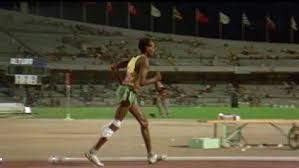 It was 7 pm on the 20th of October 1968 at the Olympic stadium in Mexico City.
It was 7 pm on the 20th of October 1968 at the Olympic stadium in Mexico City.
The light was beginning to fade and the temperature was finally starting to cool.
The closing ceremonies had just finished and the athletes and spectators were beginning to leave the stadium when they heard the sound of wailing police sirens.
Those who were high up in the stands could see motorcycles with flashing blue lights surrounding someone who was making their way towards the stadium.
Whoever it was, they were moving very slowly.
By the time the police escort got to the gates, the stadium public announcer said that a final marathon runner was making his way into the arena.
The crowd was confused.
Well over an hour earlier, Mamo Wolde of Ethiopia had charged across the line to win the marathon.
What had taken this runner so long?
The first sight of him as he came through the tunnel, wearing the colours of Tanzania, told the story.
John Stephen Akhwari’s leg was bandaged and bloody.
He had taken a bad fall early in the race, was trampled on, and hit his shoulder on the ground.
Now, nearly twenty-six miles later, it was all he could do to limp around the track.
The crowd stood and encouraged Akhwari through the last few yards of his race, with an ovation that far exceeded the one given to the man who had finished first.
When he crossed the line, he collapsed into the arms of the paramedics who immediately rushed him to hospital.
The next day, a journalist asked him the questions on everyone’s lips: why, after sustaining the kinds of injuries he had, did he get up and carry on the race, when there was no way he could win a medal?
Akhwari’s reply was: ‘My country did not send me five thousand miles to Mexico City to start the race. They sent me five thousand miles to finish it.
What do you need to take self-responsibility for finishing your race?

Recent Comments